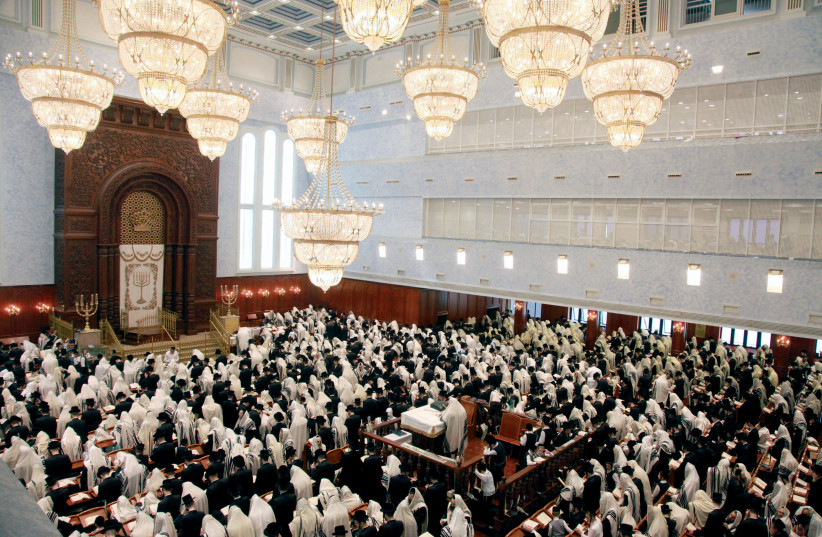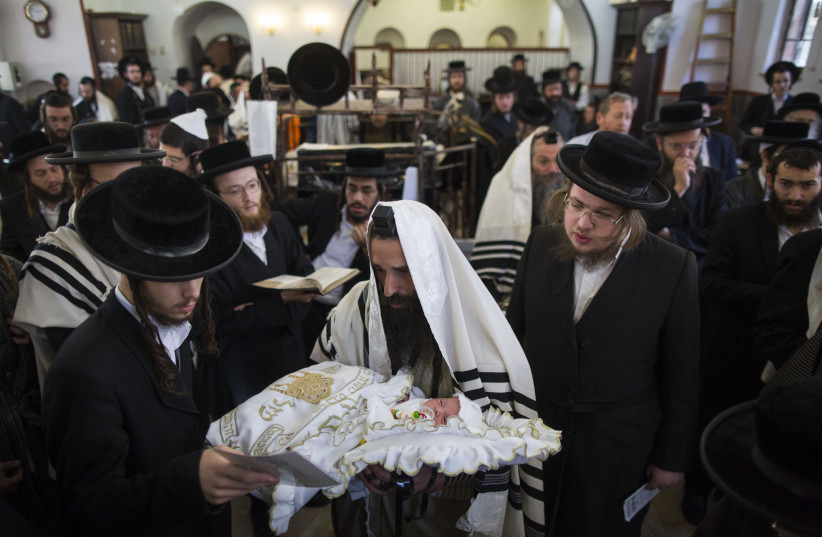The core mission of any haredi leader is to ensure that the next generation remains faithful to their tradition. In the hassidic world, this is literally the personal responsibility of the rebbe. At times, this can lead to decisions that seem from the outside to be controversial or even detrimental.
At others, this leads to decisions that may look pragmatic to the naked eye, but the keen haredi watcher will understand that this still requires serious leadership. The core motivation though is the same, and it is to take the best decision in the mind of the rebbe for his disciples.
Rabbi Yissachar Dov Rokeach is one the longest-serving hassidic leaders as head of Belz Hassidic sect for 57 years. In that time, he has shepherded the group from being a few hundred families to many thousands. Today, it is the second-largest Hassidic sect in Israel.
He has also taken it from the fringes of the anti-Zionist Eda Haredit to the center of the haredi mainstream. In recent months, the Rebbe has again shown this leadership by making some courageous decisions, especially within the context of a community best known for its ultra-conservative leadership.
Rebbe’s mission statement
During COVID, the role of the hassidic rebbes became a topic of heated debate and a cause of great controversy, when entire hassidic courts defied the restrictions of the health ministry in an attempt to keep the routine of hassidic life intact. Rabbi Dr. Tamir Granot is the head of Orot Shaul Yeshiva in Tel Aviv whose doctoral thesis focused on the hassidic renaissance after the Holocaust.

In January 2021, at the height of the COVID pandemic, Granot gave an online lecture focused on understanding the motivation for haredi leaders who gave instructions to their followers directly contravening those nationally enforced health restrictions.
At the heart of his thesis, which was not to excuse the decisions made, was to understand the core mission of every haredi leader, and perhaps especially the personal responsibility carried by any hassidic rebbe for his flock. “What’s important to the Vizhnitz Rebbe – the main thing is that his children will be a Vizhnitz, and his grandchildren will be the same and so on for the continuity of the hassidut.”
He mentioned Vizhnitz, but could have used any other as an example. During the pandemic, this meant keeping the schools open illegally, and it also meant having the rebbe’s tisch (the regular meeting of the rebbe and his disciples), again illegally.
But it also means that ultimately, the rebbe must, and does, take final and heavy responsibility for every hassid, including perhaps even taking responsibility for their lives. And all in the name of the continuation of the hassidut for future generations. This, along with the health and welfare of his flock, is what is at the top of his thoughts and drives decision-making.
The pandemic showed us this quality in the extreme, but the Belz Rebbe has, over the years, taken a series of decisions that have gone against the norm within the haredi world, similarly to the way he did so against the law of the land during COVID. But this was absolutely not the first time.
In 2005 and in what many considered a groundbreaking and maverick decision, Rokeach used his key annual address to the community to talk about employment. As quoted at the time by Yair Ettinger, the Rebbe made clear to his flock: “Long-term students in yeshivas who are talented and have the economic means, are fortunate, but students who after a year see their studies are not going well, whether because of their skills or their economic situation, must learn a profession that earns a living.” (Ha’aretz, 23.12.2023)
The innovation was that the Rebbe was specific that it was not just about going to work alone but also getting a profession. This became a pivotal moment in the task of increasing the participation rate for haredi men in the Israeli workforce.
Whereas some decisions during COVID were seen as controversial to outside society, it is the same sense of responsibility and leadership that has led to a series of trend-setting decisions since.
The Belz Plan
Prior to the last Knesset elections, an initiative including government and philanthropy became known as “The Belz Plan,” a ground-breaking initiative that would mean the teaching of math and English for the first time in selected Belz primary schools. The news broke in January 2022 with a front page splash in a leading haredi weekly with the headline, “Mamlachti Hassidi,” (State Hassidic) an almost unthinkable idea that such an important haredi group enters into the controversial program of State-run education for haredim. Although the headline did not exactly reflect the plan, the effect was enormous and became the talk of the community for months.
The plan called for externally measured results in return for increased government funding for the Belz schools. At the height of the process, the Bennet-Lapid government fell and new elections were called. In the prelude to those elections, and on the back of unrelated internal haredi political tensions, Belz was forced to give up on the plan by the now-deceased leader of the Litvak Degel Hatorah party Rabbi Gershon Edelstein.
Part of the pre-election agreement with the Likud was that Belz would, in any event, benefit from the additional budget, without providing secular studies. Given that this part of the political deal has not been fulfilled, it would not be a surprise to see Belz returning to the plan, perhaps in a different format.

Organization for ex-Belz
In the last few weeks, Belz announced that they were forming a new organization, Ahavat Kedumim, to respond to the needs of ex-Belz hassidim, many of whom are no longer religious at all. It is my understanding that this was spurred by a particular tragedy in connection with an ex-Belz hassid and the sense of responsibility that the Rebbe feels for his flock, even those no longer fully connected.
It is hard to underline the importance of this. In many haredi circles, the organizations that ex-haredim have set up are demonized in official haredi circles, some even being accused of actively proselytizing among haredim to encourage them to leave religion. Within this environment, it requires real leadership to go against the grain, not being worried that other haredi leaders may attack Belz for giving legitimacy to those who no longer follow the strictest haredi standards.
Safety in Schools
Finally, and most recently, Belz announced a partnership with the Toronto Foundation to launch the process of implementing protocols and practices developed by the Foundation to create a safe school environment and help prevent sexual abuse of the students.
This decision is significant for two reasons: It would seem to be the first meaningful institutional response to the spate of sex abuse scandals that have come to light in the last year or two in the haredi community, including, but not limited to, the Chaim Walder scandal.
The second aspect is that instead of relying upon purely internal community-based solutions, they have partnered with a trusted external body, recognized as a professional expert in the field. This suggests that the Rebbe is taking the issue very seriously.
Leadership
In the highly opaque world of haredi leadership, it is almost impossible to know the exact motivations behind decisions of this type. But at a time when there is despondency, and even animosity toward the haredi community due to the rising political and social tensions, Rabbi Yissachar Dov Rokeach’s obvious leadership is both worthy of recognition and a reason for some optimism.
The writer is a founding partner of Goldrock Capital and the founder of The Institute for Jewish and Zionist Research. He is a former chair of Gesher, World Bnei Akiva, and the Coalition for Haredi Employment.
